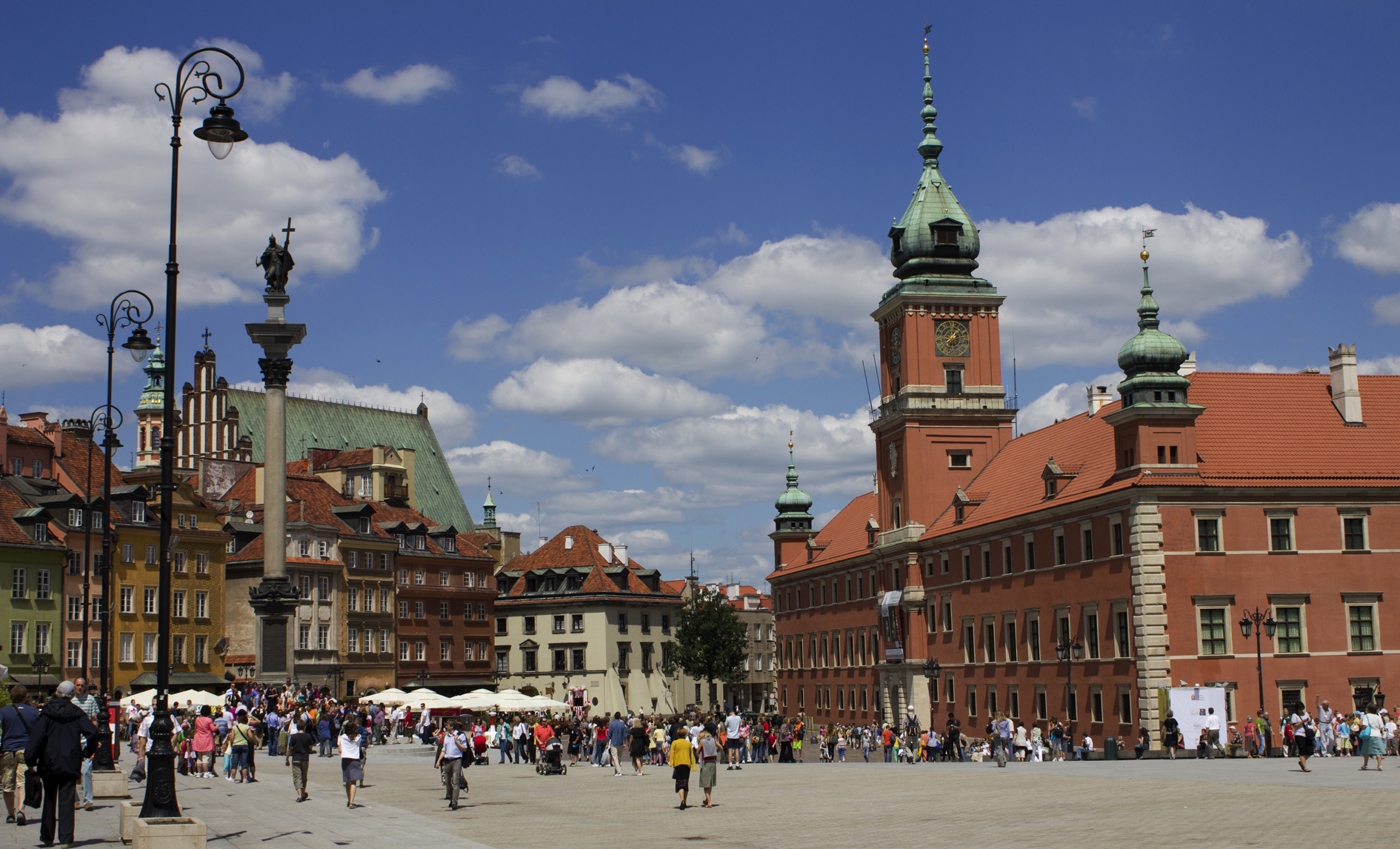INTBAU Poland and INTBAU Scandinavia are delighted to announce the programme for the 2014 Study Tour of Warsaw: Tradition and Heritage in the Contemporary Image of Cities and Towns.
The study tour is part of the programme of the international
Warsaw is the capital city of Poland and its mixture of architectural styles reflects the turbulent history of the city and the country. The city quickly developed from a small mediaeval town, to a capital full of palaces, churches and charming, richly ornamented town houses.
 The city had to be thoroughly rebuilt after the extensive damage it suffered in World War II, during which 85% of its buildings were destroyed. Shortly after the war, The Old Town was reconstructed. The main historic buildings were restored thoroughly, while others, such as tenement houses placed in back lanes, were built in a traditional style, creating a harmonious background. Several other parts of destroyed city districts were developed at the same time in a traditional way as well.
The city had to be thoroughly rebuilt after the extensive damage it suffered in World War II, during which 85% of its buildings were destroyed. Shortly after the war, The Old Town was reconstructed. The main historic buildings were restored thoroughly, while others, such as tenement houses placed in back lanes, were built in a traditional style, creating a harmonious background. Several other parts of destroyed city districts were developed at the same time in a traditional way as well.
Warsaw is also known as the city of palaces. Many aristocratic residences and mansions are located near the city centre. Luckily preserved in their original shape are two royal residences: Wilanow Palace – the Polish Versailles and Łazienki Palace, the summer villa of Stanisław August, the last king of Poland. Both royal palaces are placed on the historic urban axis, the Royal Route‚ leading from the Old Town, and both are surrounded by stunning historical gardens.
The Tour will provide an introduction to the history of the urbanism and architecture of Warsaw with a special focus on Royal Castle, Old Town and New Town of Warsaw all reconstructed after the Second World War, now listed as a UNESCO World Heritage Site.
The historic centre of Warsaw is an exceptional example of the comprehensive reconstruction of a city that had been deliberately and totally destroyed. The foundation of the material reconstruction was the inner strength and determination of the nation, which brought about the reconstruction of the heritage on a unique scale in the history of the world.
The reconstruction of the historic centre of Warsaw, associated with events of considerable historic significance, has exercised a considerable influence, in the majority of European countries, on the evolution of doctrines of urbanization and the preservation of older districts of cities.
The initiation of comprehensive conservation activities on the scale of the entire historic city was a unique European experience and contributed to the verification of conservation doctrines and practices.
from UNESCO Statements of Significance
19:00 – 20:00 Arrival in Warsaw. Accommodation
20:30 – 21:30 Dinner in Old Town
22:00 Night Sightseeing of Warsaw
Reconstruction of Historical Centre of Warsaw
The tour will be enriched by lectures by local historians, conservation officers and Poland’s UNESCO committee members who will share the experiences and challenges of conservation and modern development in Warsaw, especially around heritage sites. The lectures and discussions will take place in the Historical Museum of Warsaw, the Royal Castle and Warsaw’s Old Town’s Heritage Interpretation Centre.
10:00 – 10:30 The Warsaw Old Town’s Heritage Interpretation Centre
Meeting with Director of Historic Museum of Warsaw and UNESCO representatives.
10:30 – 12:00 Historic Museum of Warsaw walk & talk with local historians and conservation officers. Presentation of the history of the reconstruction of Warsaw.
12:00 – 13:30 Old Town Walk
The urban settlement of the Old Town and New Town (both medieval) with many churches, the Barbican, the City Walls, town houses and residences like Fukier House, Pelican House, Pod Blacha Palace, Salvator House and other Old Town residences.
13:30 – 14:30 Lunch at Old Town
15:00 – 17:00 The Royal Castle
The Castle Square and the Royal Castle which served as a residence for the kings and a place of sessions of the Polish Parliament.
Meeting with Prof. Andrzej Rottermund the Royal Castle Director and UNESCO Poland Chair
18:00 – 19:00 Presentation of Royal Castle illumination by Phillips Poland
20:00 Dinner
The Royal Route Trakt Krolewski : the route begins at Warsaw’s Castle Square and runs south down Krakowskie Przedmiescie (Krakow Suburb Street), Nowy swiat (New World Street), Aleje Ujazdowskie (Ujazdow Avenue), Belwederska (Belweder Street) finally to arrive at Wilanow (King Jan III Sobieski’s residence). The Royal Route (Stanislavian Axis) together with Saxon Axis were designed to be one of the great urban axes based on French planning principles with a line of parks, palaces and squares linking the Old Town with Warsaw’s suburbs.
Farewell dinner in Royal Gardens

Architects, planners, art historians, and other professionals with an interest in the history of European architecture, urbanism, and culture.
250 Euro (3 nights), 200 Euro (2 nights)
100 Euro without accommodation.
The registration fee includes:
– accommodation in Polonia Palace Hotel,
– dinner with local cuisine,
– banquet in Royal Gardens,
– bus from Krakow to Warsaw,
– expert guiding by local conservation officers,
– lectures and meetings with local historians and conservation officers,
– additional guiding by INTBAU Poland and INTBAU Norway.
The registration fee does not include:
– international travel to Poland,
– other meals not included above.
You can book your own hotel or register for the organised accommodation in Polonia Palace Hotel. All guests will have single rooms unless otherwise agreed.
We can also arrange accommodation for additional nights in Polonia Palace Hotel if you arrive early or would like to stay longer. Please contact Izabela Gajny at intbau@intbaupoland.com for details.

Image courtesy of Izabela Gajny, INTBAU Poland
